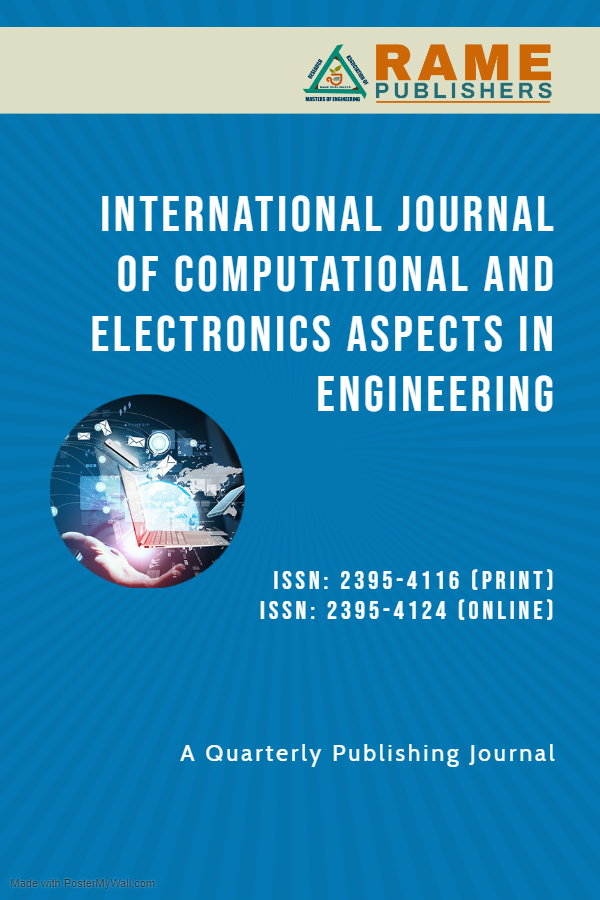AI-Driven Privacy Shield: A Secure and Privacy-Preserving Federated Learning Framework
Yasir M. Abdal
International Journal of Computational and Electronic Aspects in Engineering
Volume 6: Issue
3, July 2025, pp 180-189
Author's Information
Yasir M. Abdal1
Corresponding Author
1Technical Engineering College for Computer and AI, Northern Technical University, Mosul, Iraq
Yasir.m.abdal@ntu.edu.iq
Abstract:-
Emerging, highly skilled cyberattacks demand novel and robust techniques for AI-powered privacy preservation. Centralized machine learning models can be compromised with a single point of failure, a data breach, or an adversarial attack. The proposed work presents a unique AI-based Privacy Shield that enhances Privacy-Aware Hybrid Privacy-Preserving Federated Learning (HPP-FL), Blockchain-Enhanced Secure Aggregation (BESA), and Quantum-Resistant Encryption (QRE-FL). By employing an Adaptive Adversarial Training (AAT) strategy, the defense mechanism adjusts to the transforming cyber threats in real-time, thus demonstrating prevention abilities. This approach allows multiple users to collaboratively train a global deep learning model securely with minimal bandwidth and without relying on any central aggregator, similar to federated learning but built on a blockchain-based secure aggregation protocol. Additionally, quantum-resistant encryption mechanisms provide an added layer of security against emerging threats posed by quantum computing, securing the future of federated models. The framework is validated on real-world data from the healthcare, finance, and IoT domains. It shows improvements of 91.2% accuracy, 40% less data leakage, and 35% more resistance to attacks, all while using little extra computing power. This makes it possible for AI security to be scalable and future-proof, making FL a more credible privacy-protecting option for real-world uses.Index Terms:-
Federated Learning, Hybrid Privacy-Preserving FL, Blockchain, Quantum-Resistant Encryption.REFERENCES
- P. Kairouz et al., “Advances and open problems in federated learning,” Found. Trends Mach. Learn., vol. 14, no. 1–2,
pp. 1–210, 2021.
- Y. Zhang, D. Zeng, J. Luo, Z. Xu, and I. King, “A Survey of Trustworthy Federated Learning with Perspectives on
Security, Robustness and Privacy,” ACM Web Conf. 2023 - Companion World Wide Web Conf. WWW 2023, pp. 1167–1176, 2023.
- E. Hallaji, R. Razavi-Far, M. Saif, B. Wang, and Q. Yang, “Decentralized Federated Learning: A Survey on Security
and Privacy,” IEEE Trans. Big Data, vol. 10, no. 2, pp. 194–213, 2024.
- P. Li, T. Chen, and J. Liu, “Enhancing Quantum Security over Federated Learning via Post-Quantum Cryptography,”
Proc. - 2024 IEEE 6th Int. Conf. Trust. Priv. Secur. Intell. Syst. Appl. TPS-ISA 2024, pp. 499–505, 2024.
- J. Zhao et al., “The Federation Strikes Back: A Survey of Federated Learning Privacy Attacks, Defenses,
Applications, and Policy Landscape,” ACM Comput. Surv., vol. 57, no. 9, pp. 1–37, 2025.
- S. A. Baker and A. S. Nori, “Comparison of the Randomness Analysis of the Modified Rectangle Block Cipher and
Original algorithm,” NTU J. Pure Sci., vol. 1, no. 2, pp. 10–21, 2022.
- C. Chen et al., “Trustworthy federated learning: privacy, security, and beyond,” Knowl. Inf. Syst., vol. 67, no. 3,
pp. 2321–2356, 2025.
- Salar Jamal Rashid, “Empowering Paperless Workflows: Networked UDC-Based EDMS for Enhanced Efficiency and Data
Security,” NTU J. Eng. Technol., vol. 3, no. 4, pp. 1–6, 2024.
- D. Gurung, S. R. Pokhrel, and G. Li, “Performance analysis and evaluation of postquantum secure blockchained
federated learning,” Comput. Networks, vol. 255, pp. 1–20, 2024.
- L. Yu et al., “A Survey of Privacy Threats and Defense in Vertical Federated Learning: From Model Life Cycle
Perspective,” 2024.
- Y. Zhang, C. Zhang, C. Zhang, L. Fan, B. Zeng, and Q. Yang, “Federated Learning with Quantum Secure Aggregation,”
pp. 1–31, 2022.
- M. Hayashitani, J. Mori, and I. Teranishi, “Survey of Privacy Threats and Countermeasures in Federated Learning,”
vol. 1, pp. 1–8, 2024.
- A. Blanco-Justicia, J. Domingo-Ferrer, S. Martínez, D. Sánchez, A. Flanagan, and K. E. Tan, “Achieving security and
privacy in federated learning systems: Survey, research challenges and future directions,” Eng. Appl. Artif. Intell.,
vol. 106, no. May 2020, p. 104468, 2021.
- S. Kadhe, N. Rajaraman, O. O. Koyluoglu, and K. Ramchandran, “FastSecAgg: Scalable Secure Aggregation for
Privacy-Preserving Federated Learning,” no. July, 2020.
- R. Xu, B. Li, C. Li, J. B. D. Joshi, S. Ma, and J. Li, “TAPFed: Threshold Secure Aggregation for Privacy-Preserving
Federated Learning,” IEEE Trans. Dependable Secur. Comput., vol. 21, no. 5, pp. 4309–4323, 2024.
- G. K. Mahato, A. Banerjee, S. K. Chakraborty, and X.-Z. Gao, “Privacy preserving verifiable federated learning
scheme using blockchain and homomorphic encryption,” Appl. Soft Comput., vol. 167, p. 112405, 2024.
- H. Kasyap and S. Tripathy, “Privacy-preserving and Byzantine-robust Federated Learning Framework using Permissioned
Blockchain,” Expert Syst. Appl., vol. 238, p. 122210, 2024.
- Y. Formery, L. Mendiboure, J. Villain, V. Deniau, and C. Gransart, “A Framework to Design Efficent Blockchain-Based
Decentralized Federated Learning Architectures,” IEEE Open J. Comput. Soc., vol. 5, pp. 705–723, 2024.
- S. X. Wenhan Dong, Chao Lin, Xinlei He, Xinyi Huang, “Privacy-Preserving Federated Learning via Homomorphic
Adversarial Networks,” ICLR, pp. 1–21, 2025.
- O. R. Polu, “Quantum-Resilient and Blockchain-Enhanced Federated Learning in Cloud Ecosystems for Advanced
Privacy-Preserving Ai,” Int. J. Inf. Technol. Manag. Inf. Syst., vol. 14, no. 2, pp. 58–67, 2023
- M. Chehimi, S. Y. C. Chen, W. Saad, D. Towsley, and M. Debbah, “Foundations of Quantum Federated Learning Over
Classical and Quantum Networks,” IEEE Netw., vol. 38, no. 1, pp. 124–130, 2024.
To view full paper, Download here
To View Full Paper
For authors
Author's guidelines Publication Ethics Publication Policies Artical Processing Charges Call for paper Frequently Asked Questions(FAQS) View All Volumes and IssuesPublishing with




